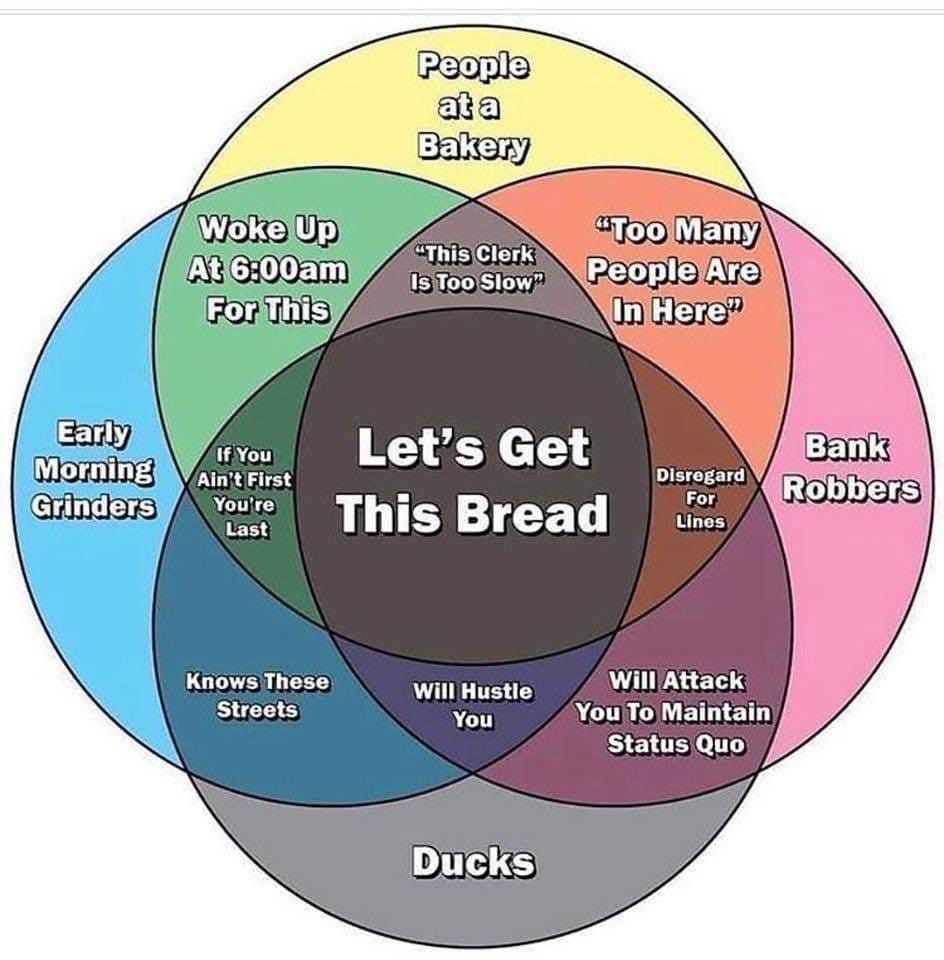Every Show Is a Bringer Show
Worlds Are Colliding! It's All Just Slipping Away . . . and You're Letting It Happen!
The title of this essay comes from an interview the comedian Mike Birbiglia did with fellow comedian Zarna Garg. For a bringer show, a comedian gets permission to perform in a bar, provided that s/he supply a paying (and drink-buying) audience. Performers cajole friends into showing up and spending money, in the hopes that the bar owners will book them for a regular show in the future.
The subtitle comes from a favorite scene from Seinfeld, in which George inveighs against his tiresome girlfriend’s attempts to “infiltrate” his group of friends:
What unites my title and subtitle? My indignation that the pressure to sell is infiltrating spheres of life where it doesn’t belong, and my sadness that so many ordinary human interactions are now distorted by the sales pitch. In this essay, I discuss three1 situations where “it’s all just slipping away.”
Are You Really Sure? Because—
I love running errands. Really! The chit chat with my grocery-store buddies lifts my spirits. In Prague I used to practice my Czech and would get a kick out of how the supposedly dour workers would break out in warm smiles when I walked into the store. In Switzerland I practice my German and even test out a few phrases of the dialect. While the cashier scans and I bag, we remark on the deliciousness of the Swiss wines I’m buying or discuss the weather or just exchange pleasantries.
But on recent visits to the US, I have noticed that these friendly exchanges have been superseded by another kind of dialogue altogether:
Me: Hi! How are you?
Clerk: Are you a rewards-club member?
Me: Um . . . no, I’m not.
Clerk [spoken in a fast monotone]: Would you like to be? Because we offer all kinds of benefits like member discounts and invitations to special in-store events2 and emails alerting you to sales and—
Me: Oh, no thanks. I’m not interested.
Clerk [again with the fast monotone]: Are you really sure? Because—
Me: No thanks. I don’t live in the US. I’m just visiting.
That last line is my way out of the spiel and into a more interesting conversation. The clerk will almost always be curious and will interrupt her pitch to ask where I do live—and we’re off, having the natural interaction we would have had in the first place, were it not for the intrusion of the sales pitch. But what about everyone else? Are they just stuck listening and refusing? We humans are social creatures, and having to reject another person introduces friction and negativity into exchanges that would otherwise be more pleasant. Or maybe we would rather be silent with our own thoughts, instead of being subjected to an ad every time we shop.
Tedious as it may be for customers to have to listen to and reject the sales pitch, imagine how much worse it is for the workers. There is a reason they always seem to deliver the pitch in rapid and robotic voices; they’re not exactly savoring every word. Their corporate bosses are forcing them to make this pitch at the start of every transaction, or their pay is linked to recruiting new members, so they feel financially compelled to make the pitch. I’m sure that they would prefer to have ordinary interactions, or even just relaxed silence, to having to recite the sales spiel, and to being rejected most of the time.
Speaking of pay, selling also intrudes on human interactions in restaurants. In contrast to Europe, where waitstaff are paid a living wage and don’t depend on tips for their income, in the US servers are usually paid well below the minimum wage—and often as little as $2.13 per hour. The tipping system incentivizes servers to push customers to buy—and eat—as much food as possible so as to run up the bill. As a treat for my son, who is an inveterate carnivore, I recently took our family out to a fancy steakhouse. I liked our waiter; not only was he charming and amusing, but he also showed me videos he had made of the pyrotechnics at a Rammstein concert he had attended the week before.
But dang if he didn’t also try to upsell at every opportunity! When we declined his offer of “apps,” he suggested that we order at least three side dishes for the table, in addition to the main courses (which are themselves sufficient to satiate nearly any appetite, given that they are served on platters the size of manhole covers). Every few minutes he came through to see if we wanted more drinks, and we still weren’t quite done with our dinners when he returned to offer us dessert. The thing is, he was responding rationally to an incentive when he tried to sell so much food to us. He had no way of knowing that I am a huge tipper, and that he would get a good tip regardless of how much food we bought.
Overeating, and a fortiori drinking to excess, especially out in the suburbs when you have to drive home, is not good for our health, our wallets, or the environment. (Even without apps and dessert, we took home a large shopping bag full of leftover food, most of which went into the trash the next day.) Let me advocate instead for the dining experience in Europe, where the servers simply take your order and don’t try to tempt you to consume more than you need. You leave the restaurant pleasantly satisfied, with no bloated feeling of having overindulged, and with confidence that the servers have been well-paid for their work.
The Curse of the Pampered Chef
Shortly after we moved to our New Jersey suburb, a phenomenon swept the neighborhood: Pampered Chef parties. The hostess would send out invitations and a catalogue to whet the appetites of her friends and neighbors. Out of neighborly solidarity, we would turn up on the appointed night to be sold to. The hostess would always have a tremendous spread laid on (I used to wonder whether, given the outlay for food and wine, any hostess ever broke even, let alone turned a profit on these parties). While we ate and drank, we would watch a demonstration. At the end of the event we were supposed to buy something, or possibly even sign up to give a future party ourselves. I went to a couple of these parties but stopped once I realized that I enjoyed neither the products if I made a purchase nor the guilt feelings if I didn’t.

Pampered Chef is an example of multi-level marketing (MLM). MLMs present themselves as a good way to make some extra cash, but the reality is decidedly otherwise. A MLM sales rep must purchase her inventory up front, often paying thousands of dollars. She then sells the products to her friends, family, and neighbors, and she recruits other people to become sales reps, who kick a percentage of the money from their own sales back up the chain. While many women enjoy selling these products as a hobby, many others get caught in debt. Studies show that 99.6 percent of people in MLMs lose money. And, from my perspective, sales parties make a poor replacement for good old-fashioned neighborhood get-togethers, whose point is catching up with friends rather than sitting through a pitch.
I hope I don’t sound like I am sneering at my friends and neighbors who hosted these parties, because I got swept up in an MLM myself, back when I was thirteen. A neighbor, whom I’ll call Julie, was a Mary Kay rep—she had a pink Cadillac and everything. I liked the Mary Kay products, and so one day I took Julie up on her repeated suggestions that I host a Mary Kay party for my friends. On the appointed day, four friends and I sat with Julie around my kitchen table, she demonstrated her products, and we tried them out. We had a great time until the end, when it became clear that Julie hoped we would all buy something. This hope was doomed to be disappointed; my friends hadn’t brought any money. I felt horrible for roping my friends into such an uncomfortable experience, and I also felt sorry for Julie, who had wasted her time on us.3 MLMs exploit our sociable nature—our desire to support our friends, our willingness to cooperate, and our reluctance to say no.
Every Job Is a Bringer Job
I have been a stay-at-home mom and housewife for more than twenty years. People often ask me when I am going back to work.4 Here are some jobs I have considered and rejected through the years:
Music Together teacher. I enjoyed taking these classes with my kids and had memorized every song in every book. Perfect, right? Then I learned that in order to be a teacher, I would have to attend (and pay for) a training program, even though I have literally decades of training in piano and voice. But whatever. The real obstacle was that I would not be assigned classes but would have had to drum up my own class roster by recruiting friends and neighbors.
Personal trainer. As a fitness enthusiast, I thought this would be a fun way to make money and help people. I had even reconciled myself to having to pay to be certified. And then I learned that gyms don’t typically pay their trainers or supply the clients. Instead, they allow trainers to roam the gym floor and troll for paying customers—and then they take a cut from the money the trainers make. No thanks.
Editor. In the good old days, I was an editor for a university press. No selling was involved; my boss sent me articles to edit and fact-check. I was disappointed to learn that very few in-house editing jobs exist today—most editing is freelance—and that if I wanted to be an editor in the new economy, I would have to spend unpaid hours networking amongst my acquaintances and trying to sell my services online.
You may be thinking, “Oh you sweet summer child. Did you not realize that this is how things work now?” I may be naive, but I am savvy enough to know that it is unjust that jobs in the gig economy are two jobs for the price (and pay) of one—the actual work we’re interested in doing, plus selling. Having to recruit our own clients is a problem for reasons beyond the stress and the additional time that selling our services entails. Not everyone likes or is good at selling. Even worse, the kind of personality that enjoys selling (extroverted and assertive) is often the opposite of the kind of personality that is suited to the job itself. For example, I am introverted, not at all assertive, and extremely concerned about other people’s feelings. These traits make me terrible at selling but are advantages for being an editor.5
First We Whip It, Then We Bridge It
Herodotus tells the story (almost certainly apocryphal) of Xerxes at the Hellespont. His soldiers built a bridge, which a storm promptly destroyed. In an impotent fury at the superior power of Mother Nature, Xerxes ordered his men to punish the Hellespont by whipping it and throwing hot irons into the water. The story is a quintessential example of our helpless rage at forces over which we have no control. (In today’s parlance we would say “Old man yells at cloud.”)

This article is my version of Xerxes whipping the Hellespont—all outrage and no solutions. Seemingly unstoppable economic forces are co-opting and commercializing normal human interactions, and I am standing on the shore raging impotently. However (as I have written before), I also believe that it’s a useful first step to notice destructive phenomena and to say, “This isn’t right! There ought to be a better way!” And then we can get to work. After Xerxes purged himself of his anger and frustration, he (or more accurately the soldiers) built a pontoon bridge across the Hellespont, which stayed intact long enough for the soldiers to cross.
The infiltration of sales into our human interactions is not inevitable. We have the power to say no. We can politely decline the rewards club—and engage the cashier in friendly conversation afterwards. We can refuse to order more food than we want—and tip our waiter big anyway. We can say no thanks to a sales party—and then invite our neighbor over for coffee or out for a walk. We can refuse jobs at companies that require us to do the unpaid additional work of finding customers for them. And we can build bridges to a more humane economy, and to each other.
How about you, readers? Have you noticed selling infiltrating your interactions? Does it bother you, or do you think it’s ok? Please share your thoughts in the comments!
The Tidbit
These Venn diagrams are always fun, and this one is particularly appropriate to today’s article. Ducks will absolutely hustle you, if you don’t keep an eye out.
An obvious example of how selling infiltrates our interactions is dating apps, which encourage people to market themselves as a product. As an old married lady, I am not qualified to discuss this topic, but I recommend two smart takes on the issue: First, Seth Stephens-Davidowitz, in his book Don’t Trust Your Gut, argues that the qualities dating apps prioritize—our looks, height and weight, and income, for example—are irrelevant to successful long-term relationships. Second, the Technopoptimism blog notes in a terrific post that there is a perverse incentive in dating apps: They make their money by keeping users on the app, so they are incentivitized to prevent users from finding a partner.
Is there anyone who actually goes to these events on purpose? Don’t most of us just blunder into the store, think to ourselves, “Oh, what a pain—an in-store event,” grab some “crudités” (as Dr. Oz would say), and skedaddle?
My guilt is somewhat tempered because in retrospect it wasn’t appropriate for an adult to ask a child to host one of these parties.
I try not to let this bother me, but sometimes I want to say, “Could it be that I have good reasons for my choices, the same as you do for yours?”
Contrary to stereotypes about bossy editors who hack up authors’ magnificent creations with our red pencils, good editors don’t try to impose our voice or style on authors. We help them express themselves clearly, yes, but in their own unique style and voice. To be a good editor, you have to be considerate of your author’s feelings and willing to let them have the final say.






I’m with Erin - this spoke to my soul. It made me so sad when a string of old friends started messaging me on Facebook, got halfway into a real conversation about how we were doing and where we were now, and then pivoted to the MLM pitch.
Most pernicious to me is OnlyFans, which touts branding and selling porn of yourself as an act of liberation and independence, and which has proven over time to do a lot less helping comfortable women self-actualize, and a lot more helping desperately impoverished women sell sex through pimps who manage their accounts for them and take a cut of their profits.
Some people who sell their porn keep it to a side account. Some incorporate it fully into their social media presence, and for those I know, I feel myself becoming both their friend and their customer. I hate it, and as a result I stop following them and lock myself out of the normal updates from their lives. Sometimes I simply don’t want to be a customer.
I really dislike the current trend of insisting that you complete a customer satisfaction survey for almost EVERY interaction. I even got one emailed to me after getting cash at my bank atm! What exactly were they expecting me to say. “Thank you for allowing me to access my own money.” Or under “how could we improve your experience ?” I was tempted to put. “Next time just give me the money without taking it from my account”!!!
A company will find out if I like them by my return visits.
Just yesterday my colleagues and I experienced the upsell at a local bar. We were sucked in by “happy hour” this particular restaurant used to have a great happy hour with half price appetizers and drinks. Now you get 1/2 price house drinks but the food (post pandemic) is no longer 1/2 price and indeed a flatbread now costs $17-22. That is not an appetizer price it is an entree price. After sharing food and yes a few drinks each the waitress asked about dessert, we partially fell for it with one person getting a cannoli (she didn’t enjoy it ) and one got coffee. Five people and the check was $250!!!!!
To your Pampered Chef story, I loved the parties and love the products (I literally use them everyday!). I also was a Tupperware rep about 30 years ago and actually made enough money for a vacation in Greece! But it was awkward hustling friends and I didn’t do it for very long. I still have many of those products still, they really do last forever!!!